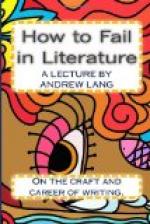In short, he who would fail must avoid simplicity like a sunken reef, and must earnestly seek either the commonplace or the bizarre, the slipshod or the affected, the newfangled or the obsolete, the flippant or the sepulchral. I need not specially recommend you to write in “Wardour-street English,” the sham archaic, a lingo never spoken by mortal man, and composed of patches borrowed from authors between Piers Plowman and Gabriel Harvey. A few literal translations of Icelandic phrases may be thrown in; the result, as furniture-dealers say, is a “made-up article.”
On the subject of style another hint may be offered. Style may be good in itself, but inappropriate to the subject. For example, style which may be excellently adapted to a theological essay, may be but ill-suited for a dialogue in a novel. There are subjects of which the poet says
Ornari res ipsa vetat, contenta doceri.
The matter declines to be adorned, and is content with being clearly stated. I do not know what would occur if the writer of the Money Article in the Times treated his topic with reckless gaiety. Probably that number of the journal in which the essay appeared would have a large sale, but the author might achieve professional failure; in the office. On the whole it may not be the wiser plan to write about the Origins of Religion in the style which might suit a study of the life of ballet dancers; the two mm. Halevy, the learned and the popular, would make a blunder if they exchanged styles. Yet Gibbon never denies himself a jest, and Montesquieu’s Esprit des Lois was called L’Esprit sur les Lois. M. Renan’s Histoire d’Israel may almost be called skittish. The French are more tolerant of those excesses than the English. It is a digression, but he who would fail can reach his end by not taking himself seriously. If he gives himself no important airs, whether out of a freakish humour, or real humility, depend upon it the public and the critics will take him at something under his own estimate. On the other hand, by copying the gravity of demeanour admired by Mr. Shandy in a celebrated parochial animal, even a very dull person may succeed in winning no inconsiderable reputation.
To return to style, and its appropriateness: all depends on the work in hand, and the audience addressed. Thus, in his valuable Essay on Style, Mr. Pater says, with perfect truth: {3}
“The otiose, the facile, surplusage: why are these abhorrent to the true literary artist, except because, in literary as in all other arts, structure is all important, felt or painfully missed, everywhere?—that architectural conception of work, which foresees the end in the beginning, and never loses sight of it, and in every part is conscious of all the rest, till the last sentence does but, with undiminished vigour, unfold and justify the first—a condition of literary art, which, in contradistinction to another quality of the artist himself, to be spoken of later, I shall call the necessity of mind in style.”




